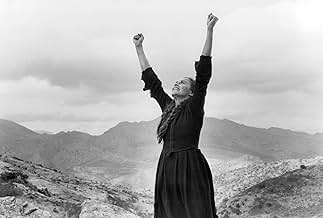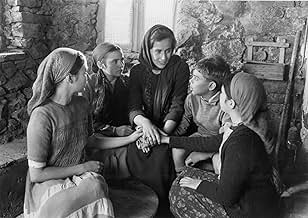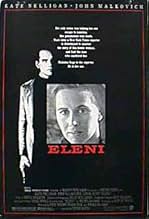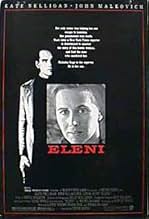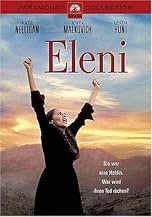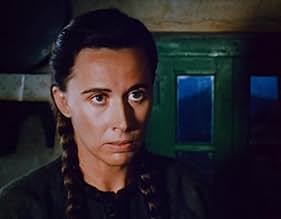IMDb RATING
6.9/10
1.8K
YOUR RATING
A mother's love for her children leads to a son's revenge for her death in this dramatic thriller that begins during the Greek civil war.A mother's love for her children leads to a son's revenge for her death in this dramatic thriller that begins during the Greek civil war.A mother's love for her children leads to a son's revenge for her death in this dramatic thriller that begins during the Greek civil war.
- Director
- Writers
- All cast & crew
- Production, box office & more at IMDbPro
6.91.7K
1
2
3
4
5
6
7
8
9
10
Featured reviews
Eleni and truth
I have seen this movie and it is very gripping and entertaining, unfortunately it does not tell the whole story of Greece and what the resistance actually was and who they were fighting. In particular this story is one that as usual suffers from lies of omission and the simplification of very complex political issues into good vs. evil. Perhaps Eleni was faced with an evil leader of the left, however do we know who and why the left was actually fighting. Quickly, Greece had a King and Aristocracy that was controlled by a military dictator before WWII, Greece was pivotal to British interests in Egypt (Suez Canal and Middle East Oil -Iran) and basically Great Britain backed this military dictator. When WWII broke out the king and dictator fled and it was the Greek people who fought the Germans and Italians, England actually fought with them at the end also. Problem, average Greek person did not want King or fascist dictator back (this is the communist group - which they were really leftist not Stalin communist). Greeks wanted to govern themselves and this is not what Great Britain - they wanted King and dictator back and guess who won . The King came back until the late 50's and 60's were Greek people won their independence. On mean idiot that was communist does not mean that all of the things the left was fighting for were wrong - this is pure and simple propaganda.
Outstanding
Powerful performances all around in this tale of a family's struggle to escape the Greek Civil War after World War II. Based on a true story, and with a powerful performance by Kate Nelligan as the title character. John Malkovich does not disappoint as her son who seeks to avenge his mother's execution. Oscar winner Linda Hunt also gives a fine supporting performance. A gripping, suspenseful mystery!
Taking sides? At least admit to it...
This is not a comment to the movie itself. The bits I have seen show at least an accurate portrayal of rural Greece in the late 40's along with the political "turmoil" of the time. Acting was above average in general, although some members of the cast, notably Malkovich, could have done a slightly better job.
So, is this propaganda? Of course it is BUT with more grains of truth than your average propaganda film, especially an American made. Yes, Mr Gatzoyannis (unless he is ashamed to use his real family name and resorts to "Gage") had lost his mother during the civil war. He is supposed to be one-sided, who wouldn't? He wrote a book about it, good for him. Someone made a film based on it, good for them. And now, many of us are bickering about what it is, propaganda or not, who are the good and who are the bad ones and so on...
A commentator before said that war is the end of civilization. True! A civil war though makes an "ordinary" war look quite civilized and "noble". Americans surely have their experience, they have gone through a terrible civil war. We, Greeks, have our experience which, sadly, is more "fresh" - lots of people that lived through it are still around to talk about it. Kids being taken from their mothers' arms to be transported..where? Brother killing brother (literally!) and generally bringing down whatever was once dear. Who's the bad guy? Which brother gets moral high ground? The one who took to mountains, kidnapped young ones to put them through a grim life behind the Iron Curtain, laid waste to his land and his home? Or the other, who after suffering all that, imprisoned those left behind (the majority of which were not part of the armed struggle and suffered along too), exiled them to desolate barren islands (there are more than we need of those in the Aegean), made them "dance" with cats in a sack (interesting how democracy, or "democracy", can be as horrendous as communism or any other totalitarian regime) and generally held them at the "border" of society until 1974. Who gets praise and who gets blame? You don't know? I think you do!
History was always written by victors, this is no exception. What is an exception in this case is that this particular "victor" (Gage) abstained his country's drama until it "suited" him to be a part of it. Having lost a loved one, a parent, in war is no unique to him, millions of people did! Did he live the ongoing "plague" that the civil war was? From the comfort of his house, half a world away. It is almost as if I, who have never been to the US, write a book about the drama of the Indians. Whatever moral high ground he possessed he lessened being that "distanced" from the whole scenery of it and its consequences. In short, this book and film portray HIS side, not his ideology's side but his personal side. It is easy to place blame, very hard to do so for one side only!
I will not go into the politics of that period, that is for another place and another time. Decent film, worth a viewing if not for anything else for an accurate portrayal of the "scenery". No stars awarded as I have not seen it all, just bits and pieces.
So, is this propaganda? Of course it is BUT with more grains of truth than your average propaganda film, especially an American made. Yes, Mr Gatzoyannis (unless he is ashamed to use his real family name and resorts to "Gage") had lost his mother during the civil war. He is supposed to be one-sided, who wouldn't? He wrote a book about it, good for him. Someone made a film based on it, good for them. And now, many of us are bickering about what it is, propaganda or not, who are the good and who are the bad ones and so on...
A commentator before said that war is the end of civilization. True! A civil war though makes an "ordinary" war look quite civilized and "noble". Americans surely have their experience, they have gone through a terrible civil war. We, Greeks, have our experience which, sadly, is more "fresh" - lots of people that lived through it are still around to talk about it. Kids being taken from their mothers' arms to be transported..where? Brother killing brother (literally!) and generally bringing down whatever was once dear. Who's the bad guy? Which brother gets moral high ground? The one who took to mountains, kidnapped young ones to put them through a grim life behind the Iron Curtain, laid waste to his land and his home? Or the other, who after suffering all that, imprisoned those left behind (the majority of which were not part of the armed struggle and suffered along too), exiled them to desolate barren islands (there are more than we need of those in the Aegean), made them "dance" with cats in a sack (interesting how democracy, or "democracy", can be as horrendous as communism or any other totalitarian regime) and generally held them at the "border" of society until 1974. Who gets praise and who gets blame? You don't know? I think you do!
History was always written by victors, this is no exception. What is an exception in this case is that this particular "victor" (Gage) abstained his country's drama until it "suited" him to be a part of it. Having lost a loved one, a parent, in war is no unique to him, millions of people did! Did he live the ongoing "plague" that the civil war was? From the comfort of his house, half a world away. It is almost as if I, who have never been to the US, write a book about the drama of the Indians. Whatever moral high ground he possessed he lessened being that "distanced" from the whole scenery of it and its consequences. In short, this book and film portray HIS side, not his ideology's side but his personal side. It is easy to place blame, very hard to do so for one side only!
I will not go into the politics of that period, that is for another place and another time. Decent film, worth a viewing if not for anything else for an accurate portrayal of the "scenery". No stars awarded as I have not seen it all, just bits and pieces.
Good Movie
Great movie, with a good performance from Kate Nelligan. Cant believe all the people defending communist kidnappers and murderers, after all the years of Nazi murders, people actually defend thugs kidnapping children, murdering villagers who refused to agree with them, etc, etc, etc.... The Greek Civil War was nothing more than Stalin trying to add Greece to his list of appetizers along with Poland, Hungary, Romania, Bulgaria, etc... Stealing children to take behind the iron curtain, executing parents who try to keep their own children, stealing houses, livestock and food crops to feed the murderers of their own people is not a good thing and this movie sends that message in spades. People are supposed to be happy about being out from under the fascist murderers and put under the domination of communist ones???????
It's about motherhood, not ideology.
Other people commenting on this film complain about its being mere propaganda against communism and supporting fascism. What a lot of baloney. It's about mothers and children, and about how, no matter what kind of brawl is going on, the men run to the hills, leaving the women and children behind to be brutalized. And it's about how one woman lost her life because she refused to give her children up to the state, no matter who that state was.
Did you know
- TriviaAdditional flashback scenes were filmed featuring Alfred Molina as Nick's father Christos (played by Steve Plytas in the 1980s scenes). Although Molina was credited as "Young Christos" in press materials, and his scenes were shown in publicity photos, his role was almost completely cut from the final version, and his name does not appear in the credits. Molina's only remaining footage in the released film is a single shot of Christos taking a photograph of Eleni, Nikola and family, with his face partially obscured by his camera.
- How long is Eleni?Powered by Alexa
Details
Box office
- Budget
- $12,000,000 (estimated)
- Gross US & Canada
- $305,102
- Opening weekend US & Canada
- $27,875
- Nov 3, 1985
- Gross worldwide
- $305,102
- Runtime
- 1h 54m(114 min)
- Color
- Sound mix
- Aspect ratio
- 1.85 : 1
Contribute to this page
Suggest an edit or add missing content

